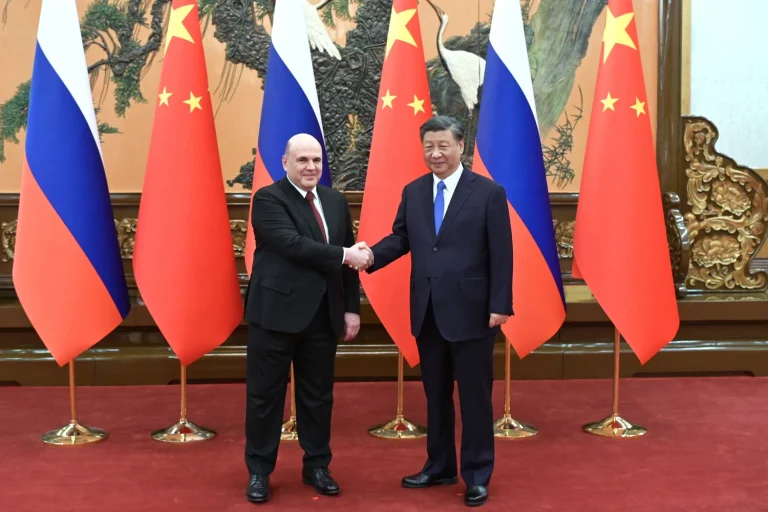In a significant show of strengthening cooperation, Chinese President Xi Jinping met with Russian Prime Minister Mikhail Mishustin in Beijing to reinforce their long-standing strategic and economic partnership. The meeting highlighted the unwavering alliance between China and Russia at a time when both nations are facing increasing geopolitical pressure from the West. It served as a reminder that the partnership between the two powers continues to evolve into a more comprehensive alliance based on mutual respect, trade expansion, and coordinated global strategy.
Strengthening Strategic Cooperation
President Xi Jinping emphasized that the relationship between China and Russia remains a deliberate and strategic choice. He described the partnership as a foundation of stability in an unpredictable global environment. Both leaders agreed to deepen cooperation across multiple areas, including energy, technology, agriculture, digital innovation, and infrastructure.
The meeting comes amid continued sanctions on Russia and economic restrictions affecting Chinese industries, prompting both nations to accelerate mutual cooperation. Xi underscored that the partnership is not driven by short-term gains but by long-term strategic trust. He called for closer coordination in foreign policy, economic development, and global governance, reaffirming that China values Russia as a reliable partner in maintaining global balance.
Focus on Economic and Technological Collaboration
Economic collaboration dominated the discussions. Xi and Mishustin reviewed existing projects and discussed new investment opportunities that could help both economies withstand external challenges. China remains Russia’s largest trading partner, with trade between the two countries surpassing $240 billion last year. However, both sides acknowledged the need to shift from raw material trade to high-value industrial and technological cooperation.
The meeting focused on expanding cooperation in the energy sector, including oil, gas, and electricity. China’s growing demand for reliable energy supplies makes Russia an essential partner, while Russia benefits from China’s large consumer base and advanced manufacturing capabilities. Xi also mentioned the importance of investing in renewable energy projects and green technology, areas that align with China’s carbon neutrality goals.
Technology was another major point on the agenda. Both leaders agreed to increase collaboration in artificial intelligence, digital economy, aerospace, and cybersecurity. By pooling expertise and resources, China and Russia aim to build independent technological ecosystems less vulnerable to Western control. They also discussed ways to integrate digital infrastructure for smoother trade and cross-border payments.
Expanding Agricultural and Trade Partnerships
Agriculture and trade remain pillars of the China-Russia partnership. During the meeting, Xi highlighted the importance of food security and sustainable agricultural practices. The two countries plan to boost agricultural trade, focusing on grain, soybeans, and fertilizers. Russia’s vast agricultural land and China’s processing and logistics networks create a complementary balance that benefits both nations.
Mishustin proposed expanding trade through border economic zones and simplifying customs procedures. The two sides are working to modernize logistics networks connecting Russia’s Far East with China’s industrial centers. These efforts aim to make trade more efficient and reduce dependency on third-party shipping routes, particularly those dominated by Western control.
Shared Stance on Global Affairs
Beyond economics, Xi and Mishustin reaffirmed their shared vision for global governance based on multipolarity and non-interference. Both countries reject what they describe as Western attempts to impose unilateral decisions on global issues. Instead, they advocate for a system where all nations have equal voices in determining international policies.
Xi noted that China and Russia will continue to cooperate closely within international organizations such as the United Nations, BRICS, and the Shanghai Cooperation Organization (SCO). He called for enhanced coordination on global security, trade, and sustainable development. Mishustin echoed the sentiment, stating that Russia will continue supporting China’s positions on sovereignty and territorial integrity, including the One-China Policy.
Energy and Infrastructure Development
Energy cooperation remains the cornerstone of China-Russia relations. During the talks, both leaders emphasized the importance of stabilizing energy supply chains and ensuring uninterrupted cooperation in oil and gas exports. Projects like the Power of Siberia pipeline are seen as long-term solutions for both countries’ energy security.
Xi also proposed expanding cooperation in infrastructure development, particularly rail and port connectivity projects linking Russia’s Arctic and Far East regions with China’s economic zones. This infrastructure expansion could further integrate both economies and open new trade corridors between Asia and Europe.
The Political Significance of the Meeting
The timing of the meeting underscores its political importance. With growing global instability, China and Russia appear united in shaping a new geopolitical order. The meeting symbolized both nations’ commitment to support each other politically and economically against Western sanctions and diplomatic isolation.
For China, the partnership with Russia strengthens its global influence, giving it a stronger foothold in energy markets and strategic diplomacy. For Russia, China’s support is vital as it seeks to navigate sanctions and economic decoupling from Western countries. The meeting sends a clear signal that Beijing and Moscow are determined to continue working together to challenge what they view as a Western-dominated global order.
Challenges Ahead
Despite the positive tone of the meeting, both sides face obstacles in implementing their ambitious goals. Trade imbalances, fluctuating energy prices, and currency settlement issues remain challenges. Western sanctions on Russia’s financial and technology sectors also complicate joint investments. Additionally, China must balance its relationship with Russia carefully to avoid further tension with the United States and Europe.
Nevertheless, both leaders expressed optimism that these challenges can be managed through strategic planning, shared innovation, and policy coordination. Xi called on both countries to focus on practical outcomes rather than political rhetoric, emphasizing projects that create tangible benefits for citizens.
The Broader Global Context
The Xi-Mishustin meeting is more than a bilateral event — it is a message to the world. It highlights the strengthening of an alternative alliance that aims to reshape the global balance of power. The growing cooperation between China and Russia serves as a reminder that both nations are intent on protecting their interests while offering a vision of global order that challenges Western hegemony.
The meeting also illustrates how major powers are realigning in the face of economic fragmentation, sanctions, and shifting alliances. By deepening ties, China and Russia are setting an example for non-Western nations seeking greater independence in global decision-making.



















